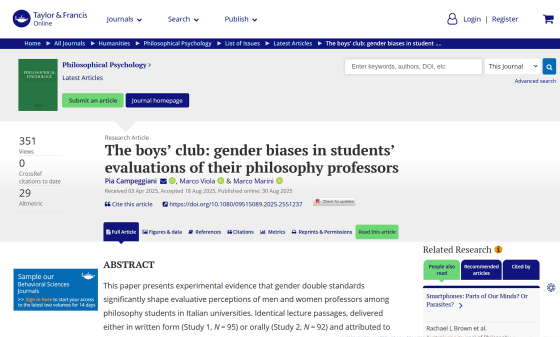Research shows that students' evaluations of identical lectures vary depending on the teacher's gender

It is known that humans have various stereotypes and prejudices about gender, which affect how they evaluate others. An Italian study examining the effect of the gender of a philosophy instructor on student evaluations showed that even if a lecture had the exact same content, it resulted in different evaluations depending on the instructor's gender.
The boys' club: gender biases in students' evaluations of their philosophy professors: Philosophical Psychology: Vol 0, No 0 - Get Access

Students identical rate lectures differently based on professor's gender, researchers find
https://www.psypost.org/students-rate-identical-lectures-differently-based-on-professors-gender-researchers-find/
While women now make up a significant proportion of early career researchers across Europe, the proportion of women among professors remains low. Philosophy is one field in which the gender gap is particularly pronounced, with women accounting for less than one-third of professors and associate professors in the philosophy department in Italy.
Previous research suggests that fields perceived as 'male-dominated' implicitly expect masculine traits such as assertiveness, confidence, and authority, which puts women at a disadvantage. Therefore, a research team led by Pia Campeggiani, an associate professor of moral philosophy at the University of Bologna in Italy, conducted an experiment to investigate gender bias surrounding philosophy. The experiment was conducted in two parts, with participants being undergraduate and graduate students majoring in philosophy at an Italian university.

In the first experiment, 95 participants read excerpts from four lectures on philosophical topics, including Aristotle's ethics and
When reading excerpts from lectures in textbooks, male subjects consistently rated the lectures more favorably and were more likely to be willing to take a full course taught by that instructor if the instructor's name was male. The only attribute for which they rated female instructors more favorably was caring, which is consistent with the stereotype of women being associated with a protective role.
On the other hand, women who read lecture excerpts in textbooks showed little bias in their ratings, except for 'overall engagement.' However, they were more likely to rate male instructors as 'willing to take a full course taught by that instructor,' which may reflect a persistent bias that persists even when women are conscious of fair evaluation.
'In our first experiment, we used textbooks, and we were surprised by the behavior of the female participants,' Campeggiani told PsyPost. 'The women were relatively unbiased in their evaluations, rating lectures similarly regardless of whether the lecturer was male or female. However, when asked whether they would take a full course from that lecturer, they showed a clear preference for males.'

In the second experiment, 92 participants listened to audio recordings of voice actors embodying typical male and female vocal characteristics delivering the same lecture excerpts. They rated the items as in the first experiment and completed an additional questionnaire measuring their gender role beliefs.
When listening to audio-based lectures, both male and female participants rated male instructors higher on all dimensions except for 'consideration.' This trend held true even for participants who held egalitarian views of gender roles, suggesting that implicit bias operates independently of personal values.
'In the second experiment, we used audio recordings to make the gender of the instructor more salient. As a result, female participants showed the same gender bias as male participants,' Campegiani said.

Campegiani said she encountered a lot of resistance in her research, which highlights the sensitivity of the topic of gender bias among teachers. She said she would like to expand her research to primary and secondary schools to examine how early patterns of gender bias emerge, and to investigate whether similar phenomena occur in fields other than philosophy.
'One of our findings is that explicit egalitarian beliefs do not necessarily lead to an absence of gender bias. In other words, everyone is affected by gender bias. Because we are all at risk of falling prey to these 'mental bugs,' we must actively cultivate self-awareness and self-criticism. At the same time, we need to put in place procedural safeguards - rules and structures that ensure our decisions, choices, and evaluations are less biased and more fair,' Campeggiani said.
Related Posts:







